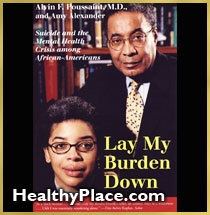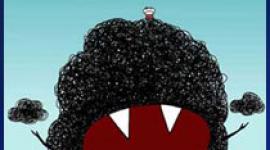Suicide Among Blacks
It's a hidden crisis and it's killing more young black men then ever. Suicide is a taboo subject among many cultures, but the denial of mental health disorders runs rampant among African Americans. Between 1980 and 1995, the suicide rate of black males doubled to about eight deaths per 100,000 people. The authors of a new book are uncovering an unspoken crisis in the African American community.
It was 1979 but Amy Alexander remembers the day like it was yesterday.
 "He was just very wonderful," recalls Amy Alexander, author of Lay My Burden Down" I looked up to him. I admired him."
"He was just very wonderful," recalls Amy Alexander, author of Lay My Burden Down" I looked up to him. I admired him."
She was just a teenager when her brother Carl took his own life. Still reeling from the tragedy, Amy teamed up with renowned Harvard psychiatrist Alvin Poussaint to dispel the myths of suicide among the black community.
"It is very much a misperception that black people don't commit suicide and that comes in part from a need the very real and legitimate need for black people for many years to be very strong," says Alexander.
"They see mental disorder and depression as a sign of personal weakness or moral failure," says psychiatrist Alvin Poussaint, M.D. of the Harvard Medical School.
The suicide rate among black men has doubled since 1980 making suicide the third leading cause of death for black men between the ages 15 and 24. Poussaint calls his own brother's death from heroin abuse a slow form of suicide.
"Psychologists and psychiatrists have to pay attention to those types of behaviors and look at them in a context in the same way they would look at someone who, in fact, was depressed or maybe suicidal," says Poussaint.
Like others, African Americans may display depression through physical symptoms like headaches and stomachaches and may complain of an aching misery.
"There must be an increased awareness about the unique aspects of mental health in black Americans."
Doctor Poussaint says one reason African-Americans may not seek out professional help is because only about 2.3% of all psychiatrists in the United States are African American. Amy feels it's important that culturally sensitive training become a part of the standard mental healthcare education process. She emphasizes mental health problems are often physically related and can be treated through talk therapy or through medication.
STARTLING STATISTICS:
Between 1980 and 1995, the suicide rate among black men doubled to nearly 8 deaths per 100,000 people. Suicide is now the third leading cause of death among black men between the ages of 15 and 24.
SILENT SITUATION:
Despite this increase in numbers, the topic of suicide is still considered "taboo". While this is true nationwide among all groups, Alvin Poussaint, M.D., a Harvard psychiatrist, says the stigma is even stronger in the black community. One problem, he says, is the stigma associated with depression itself. More than 60 percent of black individuals don't see depression as a mental illness, which makes it unlikely they will seek help for it.
Dr. Poussaint says it goes back to the days when blues music was invented as a way to sing about pain and distress. He says blacks just consider it part of life. He also says blacks pride themselves on being strong after surviving 250 years of slavery and years of segregation and discrimination. Depression, then, is seen as a sign of weakness.
OVERCOMING THE PROBLEM:
Dr. Poussaint says the first step to help is public awareness. He says, "You can't prevent illness or suicide if you don't talk about it and gain some knowledge about it." Along with this, he says education about the warning signs of suicide is needed. These signs include:
- Irritability
- Changes in appetite
- Changes in sleep habits
- Headaches, stomach aches, pain all over
- Chronic fatigue - not wanting to get up in the morning
- Sadness that continues for up to a month - spontaneous crying
- Social withdrawal - a loss of interest in activities and things once considered enjoyable
SLOW SUICIDE
Dr. Poussaint also talks about what he calls "slow suicide." This is other self- destructive behavior that can accompany depression. This includes drug addiction, alcohol addiction, gang involvement, and other high-risk behaviors.
GET HELP
Dr. Poussaint says if these characteristics describe you or anyone you know, get help. Don't deny the problem. He says, "It is not a moral weakness, and it doesn't mean you are less of a person because you reach out for help."
The National Hopeline Network 1-800-SUICIDE provides access to trained telephone counselors, 24 hours a day, 7 days a week. Or for a crisis center in your area, go here.
next: The Truth About Black Teen Suicide
~ depression library articles
~ all articles on depression
APA Reference
Gluck, S.
(2008, December 30). Suicide Among Blacks, HealthyPlace. Retrieved
on 2026, January 3 from https://www.healthyplace.com/depression/articles/suicide-among-blacks



